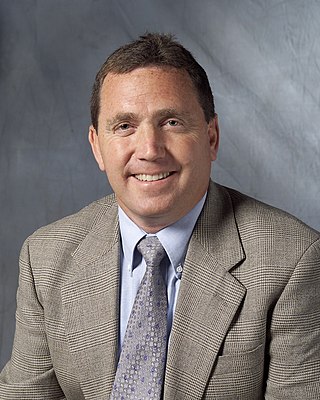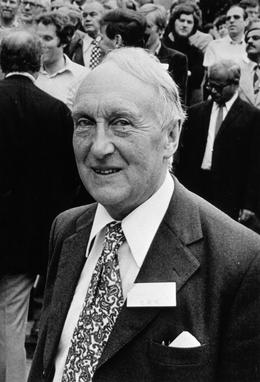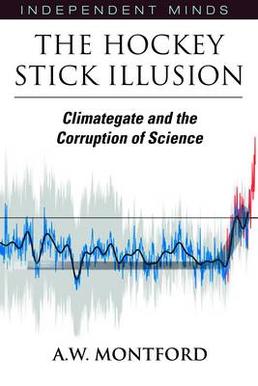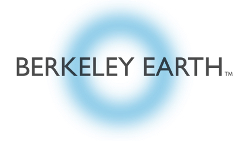
Benjamin David Santer was a climate researcher at Lawrence Livermore National Laboratory and former researcher at the University of East Anglia's Climatic Research Unit. He retired from the Lawrence Livermore National Laboratory in 2021 and is now a Distinguished Scholar in Residence at Woods Hole Oceanographic Institution. He also worked at the Max Planck Institute for Meteorology from 1987 to 1992. He specializes mainly in statistical analysis of climate data sets, and detection/attribution of climate change forcings.

Michael Evan Mann is an American climatologist and geophysicist. He is the director of the Center for Science, Sustainability & the Media at the University of Pennsylvania. Mann has contributed to the scientific understanding of historic climate change based on the temperature record of the past thousand years. He has pioneered techniques to find patterns in past climate change and to isolate climate signals from noisy data.

Hubert Horace Lamb was an English climatologist who founded the Climatic Research Unit in 1972 in the School of Environmental Sciences at the University of East Anglia.
Stephen McIntyre is a Canadian mining exploration company director, a former minerals prospector and semi-retired mining consultant whose work has included statistical analysis. He is the founder and editor of Climate Audit, a blog which analyses and discusses climate data. He is a critic of the temperature record of the past 1000 years and the data quality of NASA's Goddard Institute for Space Studies. He has made statistical critiques, with economist Ross McKitrick, of the hockey stick graph which shows that the increase in late 20th century global temperatures is unprecedented in the past 1,000 years.

Kevin Edward Trenberth worked as a climate scientist in the Climate Analysis Section at the US National Center for Atmospheric Research (NCAR). He was a lead author of the 1995, 2001 and 2007 IPCC assessment reports. He also played major roles in the World Climate Research Programme (WCRP), for example in its Tropical Oceans Global Atmosphere program (TOGA), the Climate Variability and Predictability (CLIVAR) program, and the Global Energy and Water Exchanges (GEWEX) project.
Climate Audit is a blog founded in 2005 by Steve McIntyre.

Philip Douglas Jones is a former director of the Climatic Research Unit (CRU) and a professor in the School of Environmental Sciences at the University of East Anglia (UEA) from 1998, having begun his career at the unit in 1976. He retired from these positions at the end of 2016, and was replaced as CRU director by Tim Osborn. Jones then took up a position as a Professorial Fellow at the UEA from January 2017.

Willard Anthony Watts is an American blogger who runs Watts Up With That?, a climate change denial blog that opposes the scientific consensus on climate change. A former television meteorologist and current radio meteorologist, he is also founder of the Surface Stations project, a volunteer initiative to document the condition of U.S. weather stations. The Heartland Institute helped fund some of Watts' projects, including publishing a report on the Surface Stations project, and invited him to be a paid speaker at its International Conference on Climate Change from 2008 to 2014.
The Climatic Research Unit email controversy began in November 2009 with the hacking of a server at the Climatic Research Unit (CRU) at the University of East Anglia (UEA) by an external attacker, copying thousands of emails and computer files to various internet locations several weeks before the Copenhagen Summit on climate change.

The Global Warming Policy Foundation (GWPF) is a charitable organisation in the United Kingdom whose aims are to challenge what it calls "extremely damaging and harmful policies" envisaged by governments to mitigate anthropogenic global warming. The GWPF, and some of its prominent members individually, have been characterised as practising and promoting climate change denial.
HadCRUT is the dataset of worldwide monthly instrumental temperature records formed by combining the sea surface temperature records compiled by the Hadley Centre of the UK Met Office and the land surface air temperature records compiled by the Climatic Research Unit (CRU) of the University of East Anglia.

Climatic Research Unit documents including thousands of e-mails and other computer files were stolen from a server at the Climatic Research Unit of the University of East Anglia in a hacking incident in November 2009. The documents were redistributed first through several blogs of global warming deniers, who alleged that the documents indicated misconduct by leading climate scientists. A series of investigations rejected these allegations, while concluding that CRU scientists should have been more open with distributing data and methods on request. Precisely six committees investigated the allegations and published reports, finding no evidence of fraud or scientific misconduct. The scientific consensus that global warming is occurring as a result of human activity remained unchanged by the end of the investigations.
Watts Up With That? (WUWT) is a blog promoting climate change denial that was created by Anthony Watts in 2006.
Andrew William Montford is a British writer and editor who is the owner of the Bishop Hill blog. He is the author of The Hockey Stick Illusion (2010).

The Hockey Stick Illusion: Climategate and the Corruption of Science is a book written by Andrew Montford and published by Stacey International in 2010, which promotes climate change denial.

Eduardo Zorita is a Spanish paleoclimatologist. As of 2010, he is a Senior Scientist at the Institute for Coastal Research, GKSS Research Centre in Geesthacht, Germany, where he has worked since 1996. Zorita is review editor of the journal Climate Research.

Berkeley Earth is a Berkeley, California-based independent 501(c)(3) non-profit focused on land temperature data analysis for climate science. Berkeley Earth was founded in early 2010 to address the major concerns from outside the scientific community regarding global warming and the instrumental temperature record. The project's stated aim was a "transparent approach, based on data analysis." In February 2013, Berkeley Earth became an independent non-profit. In August 2013, Berkeley Earth was granted 501(c)(3) tax-exempt status by the US government. The primary product is air temperatures over land, but they also produce a global dataset resulting from a merge of their land data with HadSST.
Freedom of Information requests to the Climatic Research Unit featured in press discussions of disputes over access to data from instrumental temperature records, particularly during the Climatic Research Unit email controversy which began in November 2009.

Global surface temperature (GST) is the average temperature of Earth's surface. More precisely, it is the weighted average of the temperatures over the ocean and land. The former is also called sea surface temperature and the latter is called surface air temperature. Temperature data comes mainly from weather stations and satellites. To estimate data in the distant past, proxy data can be used for example from tree rings, corals, and ice cores. Observing the rising GST over time is one of the many lines of evidence supporting the scientific consensus on climate change, which is that human activities are causing climate change. Alternative terms for the same thing are global mean surface temperature (GMST) or global average surface temperature.
The history of climate change policy and politics refers to the continuing history of political actions, policies, trends, controversies and activist efforts as they pertain to the issue of climate change. Climate change emerged as a political issue in the 1970s, when activist and formal efforts sought to address environmental crises on a global scale. International policy regarding climate change has focused on cooperation and the establishment of international guidelines to address global warming. The United Nations Framework Convention on Climate Change (UNFCCC) is a largely accepted international agreement that has continuously developed to meet new challenges. Domestic policy on climate change has focused on both establishing internal measures to reduce greenhouse gas emissions and incorporating international guidelines into domestic law.













